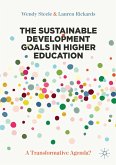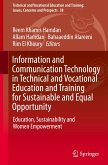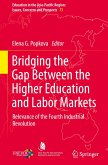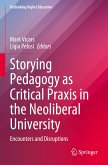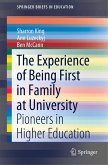University 4.0 and Educational Technology for Sustainable Development
Best Practices and Perspectives in Russia and Central Asia
Herausgegeben:Sergi, Bruno S.; Popkova, Elena G.; Adieva, Ainura A.; Atabekova, Nurgul K.
University 4.0 and Educational Technology for Sustainable Development
Best Practices and Perspectives in Russia and Central Asia
Herausgegeben:Sergi, Bruno S.; Popkova, Elena G.; Adieva, Ainura A.; Atabekova, Nurgul K.
- Gebundenes Buch
- Merkliste
- Auf die Merkliste
- Bewerten Bewerten
- Teilen
- Produkt teilen
- Produkterinnerung
- Produkterinnerung
This book introduces University 4.0 as an Educational Technology subject and studies in detail the processes of formation and development of Universities 4.0. It includes materials and applied recommendations for improving the management of Universities 4.0, as well as for the transition to Educational Technology through the creation of Universities 4.0. It also contains recommendations for improving the effectiveness of state regulation of Educational Technology in general and Universities 4.0, in particular, in the interests of sustainable development. The first part of the book forms the…mehr
Andere Kunden interessierten sich auch für
![The Sustainable Development Goals in Higher Education The Sustainable Development Goals in Higher Education]() Wendy SteeleThe Sustainable Development Goals in Higher Education27,99 €
Wendy SteeleThe Sustainable Development Goals in Higher Education27,99 €![Information and Communication Technology in Technical and Vocational Education and Training for Sustainable and Equal Opportunity Information and Communication Technology in Technical and Vocational Education and Training for Sustainable and Equal Opportunity]() Information and Communication Technology in Technical and Vocational Education and Training for Sustainable and Equal Opportunity151,99 €
Information and Communication Technology in Technical and Vocational Education and Training for Sustainable and Equal Opportunity151,99 €![Information and Communication Technology in Technical and Vocational Education and Training for Sustainable and Equal Opportunity Information and Communication Technology in Technical and Vocational Education and Training for Sustainable and Equal Opportunity]() Information and Communication Technology in Technical and Vocational Education and Training for Sustainable and Equal Opportunity151,99 €
Information and Communication Technology in Technical and Vocational Education and Training for Sustainable and Equal Opportunity151,99 €![Bridging the Gap Between the Higher Education and Labor Markets Bridging the Gap Between the Higher Education and Labor Markets]() Bridging the Gap Between the Higher Education and Labor Markets91,99 €
Bridging the Gap Between the Higher Education and Labor Markets91,99 €![Seven Radical Ideas for the Future of Higher Education Seven Radical Ideas for the Future of Higher Education]() Claire MackenSeven Radical Ideas for the Future of Higher Education49,99 €
Claire MackenSeven Radical Ideas for the Future of Higher Education49,99 €![Storying Pedagogy as Critical Praxis in the Neoliberal University Storying Pedagogy as Critical Praxis in the Neoliberal University]() Storying Pedagogy as Critical Praxis in the Neoliberal University106,99 €
Storying Pedagogy as Critical Praxis in the Neoliberal University106,99 €![The Experience of Being First in Family at University The Experience of Being First in Family at University]() Sharron KingThe Experience of Being First in Family at University38,99 €
Sharron KingThe Experience of Being First in Family at University38,99 €-
-
-
This book introduces University 4.0 as an Educational Technology subject and studies in detail the processes of formation and development of Universities 4.0. It includes materials and applied recommendations for improving the management of Universities 4.0, as well as for the transition to Educational Technology through the creation of Universities 4.0. It also contains recommendations for improving the effectiveness of state regulation of Educational Technology in general and Universities 4.0, in particular, in the interests of sustainable development.
The first part of the book forms the theoretical foundations of University 4.0 as a scientific concept, presenting a view from the standpoint of sustainable development. The second part defines the place of University 4.0 in the sustainable development strategy of Russia and Central Asia. The third part reveals best practices for creating and developing Universities 4.0 in Russia and Central Asia. The fourth part focuseson the contribution of Universities 4.0 to the sustainable development of Russia and Central Asia. The fifth part provides recommendations for improving University 4.0 management in support of the sustainable development of Russia and Central Asia. This book is suitable for scholars studying higher education, the society and economy of Russia and Central Asia, and sustainable development. It is also of interest to practising experts, university leaders and state regulators of education.
The first part of the book forms the theoretical foundations of University 4.0 as a scientific concept, presenting a view from the standpoint of sustainable development. The second part defines the place of University 4.0 in the sustainable development strategy of Russia and Central Asia. The third part reveals best practices for creating and developing Universities 4.0 in Russia and Central Asia. The fourth part focuseson the contribution of Universities 4.0 to the sustainable development of Russia and Central Asia. The fifth part provides recommendations for improving University 4.0 management in support of the sustainable development of Russia and Central Asia. This book is suitable for scholars studying higher education, the society and economy of Russia and Central Asia, and sustainable development. It is also of interest to practising experts, university leaders and state regulators of education.
Produktdetails
- Produktdetails
- Education in the Asia-Pacific Region: Issues, Concerns and Prospects 75
- Verlag: Springer / Springer Nature Singapore / Springer, Berlin
- Artikelnr. des Verlages: 978-981-96-7375-9
- Seitenzahl: 408
- Erscheinungstermin: 7. Juli 2025
- Englisch
- Abmessung: 241mm x 160mm x 28mm
- Gewicht: 774g
- ISBN-13: 9789819673759
- ISBN-10: 9819673755
- Artikelnr.: 73989168
- Herstellerkennzeichnung
- Springer-Verlag GmbH
- Tiergartenstr. 17
- 69121 Heidelberg
- ProductSafety@springernature.com
- Education in the Asia-Pacific Region: Issues, Concerns and Prospects 75
- Verlag: Springer / Springer Nature Singapore / Springer, Berlin
- Artikelnr. des Verlages: 978-981-96-7375-9
- Seitenzahl: 408
- Erscheinungstermin: 7. Juli 2025
- Englisch
- Abmessung: 241mm x 160mm x 28mm
- Gewicht: 774g
- ISBN-13: 9789819673759
- ISBN-10: 9819673755
- Artikelnr.: 73989168
- Herstellerkennzeichnung
- Springer-Verlag GmbH
- Tiergartenstr. 17
- 69121 Heidelberg
- ProductSafety@springernature.com
Prof. Bruno S. Sergi is an Instructor at Harvard University, where he is also a Faculty Affiliate at the Center for International Development and an Associate at the Harvard Davis Center for Russian and Eurasian Studies. He is a Full Professor at the University of Messina, Italy. His research and teaching interests are tied to the broader topic of the economics of emerging markets. In addition, he is Co-director of the Lab for Entrepreneurship and Development (LEAD), a research laboratory based in Cambridge (USA) that aims to generate and share knowledge about entrepreneurship, development, and sustainability. Prof. Dr. Elena G. Popkova, Doctor of Economics, is a Director of the Laboratory of Scientometrics and International Rankings at Armenian State University of Economics (Yerevan, Armenia), Professor of RUDN University (Moscow, Russia). She is the author of more than 300 publications in Scopus (h-index: 40). She is also editor of more than 50 books and a large number of special issues of international peer-reviewed scientific journals. She is a member of the editorial board of the International Journal of Economic Policy in Emerging Economies and the International Journal for Quality Research. She is the Recipient of Highly Commended Paper Award for the journal On the Horizon for 2020 (Emerald). Elena G. Popkova is Honoured worker of science and high technologies of the Russian Federation and Honoured professor of Osh State University (Osh, Kyrgyzstan). She is among Scopus top 2% of most-cited scholars of the world in 2019-2024. Ainura A. Adieva is the rector of International University of Kyrgyzstan, Bishkek, Kyrgyzstan. In 1991, she has graduate from Frunze Polytechnic Institute (specialty “Economics and management). She received her Ph.D. in 1996 and Doctor of economics – in 2012. She received the academic title of associate professor of economics in 2005 and professor of economics in 2016. She is the author of more than sixty scientific works, including four monographs. She supervised fourteen Ph.D.’s in economics. Ainura A. Adieva is the member of the Council for science, innovations and investments under the Government of the Kyrgyz Republic. Nurgul K. Atabekova Nurgul K. Atabekova is Vice-Rector for Science and Innovation at the International University of Kyrgyzstan, Bishkek, Kyrgyzstan. She is a PhD in Law, PhD in Philology, Associate Professor of Law and Linguistics.She is the author of more than seventy publications, including two monographs and twelve educational and methodological works. From 2018 to 2022 Nurgul K. Atabekova was a member of the Scientific and Technical Council of the Ministry of Education and Science of the Kyrgyz Republic, currently she is the Chair of the Expert Council on Social and Humanitarian Sciences. Nurgul K. Atabekova is a member of the editorial board of scientific journals 1) “Bulletin of Kyrgyzpatent: Issues of Intellectual Property and Innovation” of the State Agency of Intellectual Property and Innovation under the Cabinet of Ministers of the Kyrgyz Republic, 2) “Bulletin of the Legal Academy” of the Ministry of Justice of the Russian Federation, 3) “Bulletin of the Constitutional Court of the Kyrgyz Republic”.
Part 1 Universities 4.0 as Centers for Implementing Advanced Educational Technologies in Russia and Central Asia.- 1 Advanced Experience of Sustainable Development of EdTech Based on Universities 4.0 in Russia and Central Asia for Strategic Academic Leadership.- 2 Life Values of a Modern University and Their Transformation under the Influence of Globalization and Digitalization.- 3 Life Values of a University Striving for Digital Inclusion in a Globalizing World.- 4 An Algorithm for Achieving Digital Inclusion of a University in a Globalizing World.- 5 Motivation for Teaching Students in the Pedagogical Field Within the Framework of the University 4.0 Education Model.- 6 Constructing the Image of the Global University through its Official Website (based on About Pages).- 7 The Russian Experience in Identifying Leading Universities.- Part 2 Dimensions of Inclusiveness of Universities 4.0 in Support of Sustainable Development of Higher Education in Russia and Central Asia.- 8 Cultural Inclusiveness of Universities in the Context of the Development of International Higher Education.- 9 Gender Neutrality of the University as the Basis for Its Inclusiveness.- 10 Anti-ageism and Openness to Lifelong Learning, Work-Life Balance in an Inclusive University.- 11 The Inclusion of People with Disabilities in Higher Education.- 12 Accessibility of Higher Education for People with Different Income Levels as a Manifestation of the Inclusiveness of the University.- 13 Influence of Science on the Development of the Moral Consciousness of Students.- 14 Macroeconomic Implications and Prospects for Increasing Inclusiveness of the National Science and Higher Education System.- Part 3 Communications and Reputation of Universities 4.0 in the Context of Internationalization of Higher Education in Russia and Central Asia.- 15 Life Values of Universities in Russia and the Latest Trends in Their Transformation in the Globalizing World.- 16 Problems and Prospects of Intercultural Dialogue in a Multinational Classical University in a Globalizing World: The Experience of Modern Russia.- 17 Problems of Higher Education in Modern Russia in the Context of the Large-Scale Process of Internationalization of Universities.- 18 Image Communications of Universities: Current Technologies.- 19 Features of Influence Marketing Technologies in the Field of the Promotion of Higher Education Institution.- 20 Study of the Impact of Reputation of Higher Education Institution on its Ranking.- 21 Features of Promoting the Image of Higher Educational Institutions in the Media Space.- 22 The Product Approach in Marketing Control: The Practice of Implementation in Educational Institutions of Higher Education.- Part 4 Management of Universities 4.0, Workforce Preparation, and the Connection of Higher Education with the Labor Market in Russia and Central Asia..- 23 Survey on Culture Knowledge System in Senior High School English Textbooks.- 24 Collaboration for Supporting Creative Activities.- 25 Training IT Specialists for Cooperative Organizations in Contemporary Conditions.- 26 Training Green Personnel in Higher Education Institutions for Cooperatives from the Standpoint of Pedagogy and Psychology.- 27 Impact of Neural Networks on the Labor Market.- 28 Improving the Organizational Management Structure of a Research Organization Based on a Project Approach.- 29. Professional Training of Green Personnel in Higher Educational Institutions through Information and Communication Technologies.- 30 Preparation of Ecologically Oriented Personnel for Collaboration Through Cooperation with Green Non-Governmental Organizations.- Part 5 The Relationship between EdTech, Digital Inclusiveness, and University Management Strategies in Russia and Central Asia.- 31 Flexibility of the University s Digital Inclusion Strategy in a Globalizing World Based on Its Competitiveness.- 32 Organization of Intercultural Dialogue in a Multinational Classical University Based on Its Digitalization: from an Inclusive Environment to Global Openness.- 33 Inclusiveness of Universities as the Basis of Their Global Competitiveness: A View from the Standpoint of Rankings ARWU, QS and THE.- 34 Digital Inclusion as a Macroeconomic Mechanism for Solving the Problem of Higher Education in Russia in the Context of the Large-Scale Process of Internationalization of Universities.- 35 Prospects for Increasing the Attractiveness of Russian Education based on the Internationalization of Universities.- 36 Reputation Management of a Contemporary University in the Context of the 5-100 Project and the Priority 2030 Program.- 37 Analysis of the Effectiveness of Channels for Promoting Educational Services in the Tasks of Training Personnel for the Communication Industry: A Case Study of the Educational Program Advertising and Public Relations at the Institute of World Economy and Business of RUDN.
Part 1 Universities 4.0 as Centers for Implementing Advanced Educational Technologies in Russia and Central Asia.- 1 Advanced Experience of Sustainable Development of EdTech Based on Universities 4.0 in Russia and Central Asia for Strategic Academic Leadership.- 2 Life Values of a Modern University and Their Transformation under the Influence of Globalization and Digitalization.- 3 Life Values of a University Striving for Digital Inclusion in a Globalizing World.- 4 An Algorithm for Achieving Digital Inclusion of a University in a Globalizing World.- 5 Motivation for Teaching Students in the Pedagogical Field Within the Framework of the University 4.0 Education Model.- 6 Constructing the Image of the Global University through its Official Website (based on About Pages).- 7 The Russian Experience in Identifying Leading Universities.- Part 2 Dimensions of Inclusiveness of Universities 4.0 in Support of Sustainable Development of Higher Education in Russia and Central Asia.- 8 Cultural Inclusiveness of Universities in the Context of the Development of International Higher Education.- 9 Gender Neutrality of the University as the Basis for Its Inclusiveness.- 10 Anti-ageism and Openness to Lifelong Learning, Work-Life Balance in an Inclusive University.- 11 The Inclusion of People with Disabilities in Higher Education.- 12 Accessibility of Higher Education for People with Different Income Levels as a Manifestation of the Inclusiveness of the University.- 13 Influence of Science on the Development of the Moral Consciousness of Students.- 14 Macroeconomic Implications and Prospects for Increasing Inclusiveness of the National Science and Higher Education System.- Part 3 Communications and Reputation of Universities 4.0 in the Context of Internationalization of Higher Education in Russia and Central Asia.- 15 Life Values of Universities in Russia and the Latest Trends in Their Transformation in the Globalizing World.- 16 Problems and Prospects of Intercultural Dialogue in a Multinational Classical University in a Globalizing World: The Experience of Modern Russia.- 17 Problems of Higher Education in Modern Russia in the Context of the Large-Scale Process of Internationalization of Universities.- 18 Image Communications of Universities: Current Technologies.- 19 Features of Influence Marketing Technologies in the Field of the Promotion of Higher Education Institution.- 20 Study of the Impact of Reputation of Higher Education Institution on its Ranking.- 21 Features of Promoting the Image of Higher Educational Institutions in the Media Space.- 22 The Product Approach in Marketing Control: The Practice of Implementation in Educational Institutions of Higher Education.- Part 4 Management of Universities 4.0, Workforce Preparation, and the Connection of Higher Education with the Labor Market in Russia and Central Asia..- 23 Survey on Culture Knowledge System in Senior High School English Textbooks.- 24 Collaboration for Supporting Creative Activities.- 25 Training IT Specialists for Cooperative Organizations in Contemporary Conditions.- 26 Training Green Personnel in Higher Education Institutions for Cooperatives from the Standpoint of Pedagogy and Psychology.- 27 Impact of Neural Networks on the Labor Market.- 28 Improving the Organizational Management Structure of a Research Organization Based on a Project Approach.- 29. Professional Training of Green Personnel in Higher Educational Institutions through Information and Communication Technologies.- 30 Preparation of Ecologically Oriented Personnel for Collaboration Through Cooperation with Green Non-Governmental Organizations.- Part 5 The Relationship between EdTech, Digital Inclusiveness, and University Management Strategies in Russia and Central Asia.- 31 Flexibility of the University s Digital Inclusion Strategy in a Globalizing World Based on Its Competitiveness.- 32 Organization of Intercultural Dialogue in a Multinational Classical University Based on Its Digitalization: from an Inclusive Environment to Global Openness.- 33 Inclusiveness of Universities as the Basis of Their Global Competitiveness: A View from the Standpoint of Rankings ARWU, QS and THE.- 34 Digital Inclusion as a Macroeconomic Mechanism for Solving the Problem of Higher Education in Russia in the Context of the Large-Scale Process of Internationalization of Universities.- 35 Prospects for Increasing the Attractiveness of Russian Education based on the Internationalization of Universities.- 36 Reputation Management of a Contemporary University in the Context of the 5-100 Project and the Priority 2030 Program.- 37 Analysis of the Effectiveness of Channels for Promoting Educational Services in the Tasks of Training Personnel for the Communication Industry: A Case Study of the Educational Program Advertising and Public Relations at the Institute of World Economy and Business of RUDN.


